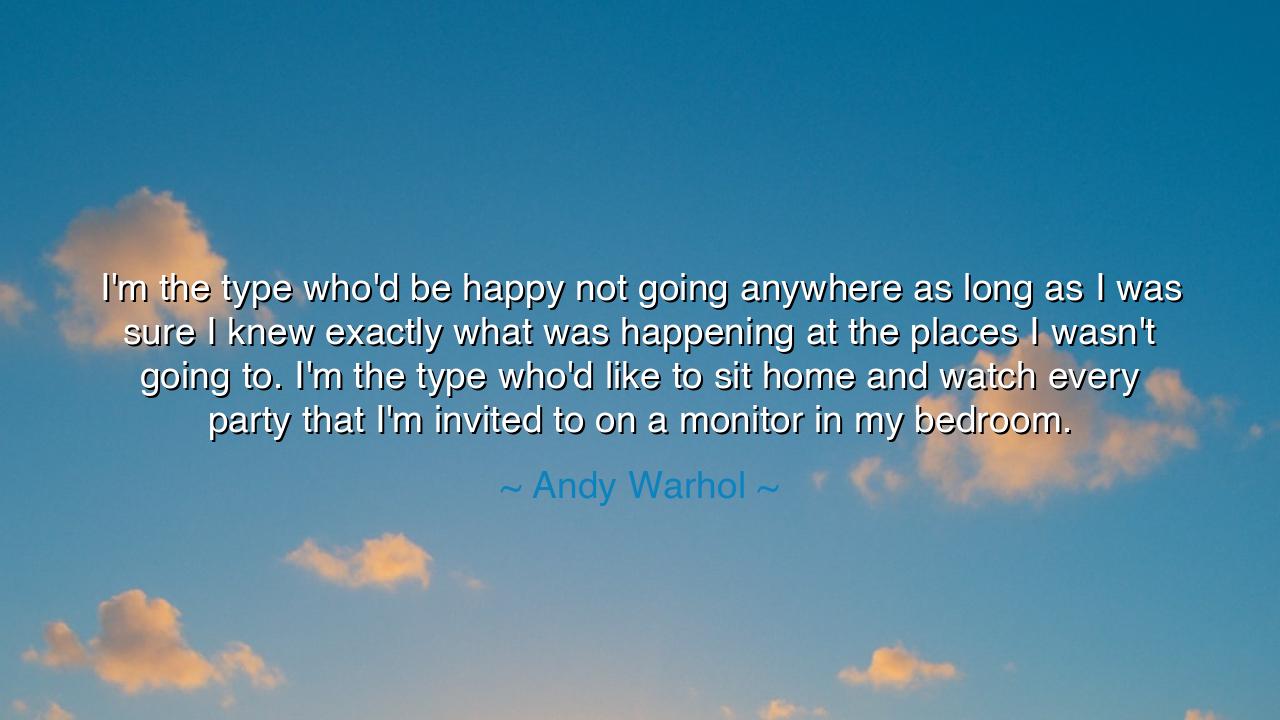
I'm the type who'd be happy not going anywhere as long as I was
I'm the type who'd be happy not going anywhere as long as I was sure I knew exactly what was happening at the places I wasn't going to. I'm the type who'd like to sit home and watch every party that I'm invited to on a monitor in my bedroom.






“I’m the type who’d be happy not going anywhere as long as I was sure I knew exactly what was happening at the places I wasn’t going to. I’m the type who’d like to sit home and watch every party that I’m invited to on a monitor in my bedroom.” Thus spoke Andy Warhol, the prophet of the modern age, whose art reflected not the past glories of man, but the shimmering surfaces of his present — an age of mirrors, of images, of endless observation. In these words, half jest and half revelation, Warhol reveals the paradox of the modern soul: the desire to see everything while doing nothing, to witness life yet remain untouched by it. Beneath his humor lies a meditation on what it means to live in a world where connection and isolation intertwine.
Warhol lived in an age that was beginning to worship the image — the photograph, the television, the celebrity, the screen. To him, the screen was both veil and window: a way to see the world without having to enter it. His quote captures the strange longing of the observer, the one who wishes to experience life not through the body but through the eye, not through presence but through knowledge. “I’d be happy not going anywhere,” he says — for what he seeks is not participation, but awareness. He does not crave the joy of the party, but the certainty of knowing it — the power of perception without the cost of vulnerability.
To understand the origin of this thought, we must look at Warhol’s world — the glittering, chaotic New York of the 1960s. At his studio, the Factory, artists, models, and misfits gathered in an endless carnival of creation and excess. Warhol was at the center of it all — and yet, always apart. He watched, recorded, and transformed life into art. He filmed his friends sleeping, eating, talking; he turned them into icons, reducing the messy pulse of existence into serene images of repetition and light. His quote reflects this same spirit: a desire to know life completely, yet from the safety of distance. For Warhol, to watch was to control, and to control was to create.
There is something deeply human — and deeply ancient — in this desire to observe without acting. Even in the times of the ancients, the philosophers sought detachment. The Stoics taught that peace lies in seeing the world clearly, untroubled by its passions. But Warhol’s detachment is of a different kind: not the serenity of wisdom, but the numbness of overstimulation. His is the voice of the modern man, overwhelmed by the vastness of experience, seeking refuge behind the glowing screen. In an age where everything can be seen, to watch becomes easier than to live.
And yet, Warhol’s words carry a quiet sadness. To wish to “watch every party” is to confess the ache of curiosity — the fear of missing out, the longing to be everywhere at once. It is the same desire that drives the scroll of the social feed today, where one may see the lives of others yet never truly touch them. Warhol foresaw this age of voyeurism, where presence is replaced by perception and friendship by footage. His irony conceals a prophecy: that one day humanity would indeed sit in their homes, watching the world from screens, connected and yet profoundly alone.
Still, his words are not condemnation alone — they are a mirror, and mirrors do not judge; they only reflect. Warhol shows us what we have become so that we might see ourselves more clearly. To be the observer is not a sin, but it is not enough. Life demands participation, the risk of imperfection, the vulnerability of presence. The party must not be watched from afar; it must be joined. To know about life is one thing; to live it is another.
Lesson: The eye may see everything, but only the heart can feel what is real. In this age of screens and shadows, do not be content to watch life pass by. Go to the places you fear to go, speak to the people you wish to know, and dance even when no one is watching. For though observation can reveal truth, only experience can reveal meaning.
Thus, let Andy Warhol’s words stand as both warning and wisdom. To sit behind the glass is safe, but to step beyond it is to be alive. Know the world, yes — but also touch it, breathe it, love it. For the true artist of life is not only the one who sees, but the one who lives what he sees.






AAdministratorAdministrator
Welcome, honored guests. Please leave a comment, we will respond soon